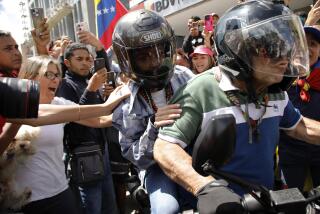Thousands in Yugoslavia Protest Election Reversals
BELGRADE, Yugoslavia — Chanting “We won’t give up our victory” and hurling eggs at state buildings, more than 100,000 protesters brought this capital to a standstill Monday in the largest demonstration against Serbia’s hard-line president, Slobodan Milosevic.
Demanding an end to Milosevic’s autocratic rule, huge crowds across Yugoslavia protested a court decision the night before that canceled opposition victories in many municipal elections.
Despite his recent attempts at rehabilitation as a peacemaker and democrat in the West’s eyes, Milosevic--a onetime strident nationalist widely seen as the architect of the ethnic war in neighboring Bosnia-Herzegovina--refused to accept defeat for his ruling Socialist Party. His actions have infuriated Serbs like never before.
“This is the democratic revolution that Serbia has been awaiting for years,” cried angry opposition leader Zoran Djindjic of the Democratic Party, who would have become Belgrade’s first non-Communist mayor since World War II if the election results had been allowed to stand.
“We are daily picking leaf by leaf off their dictatorship,” Djindjic told the crowd, a boisterous mass of demonstrators of all ages and backgrounds who snaked through downtown Belgrade screaming “Red bandits!” and “Slobo, Saddam!”
Serbia is the dominant entity within the rump Yugoslavia, which includes Montenegro, following the 1991 disintegration of the Yugoslav federation. Milosevic is president of Serbia but widely regarded as the strongman of Yugoslavia--and one of the most powerful men in the Balkans.
The Nov. 17 landslide opposition victory in 15 of Serbia’s 18 biggest towns took Milosevic’s Socialists--and Western governments--by surprise.
Street protests, rare under Milosevic’s authoritarian rule, have mounted steadily ever since. Yet it is unclear what steps the traditionally timid and fragmented opposition will take next. Opposition leaders feel isolated from the outside world, accusing the West of largely blind support for Milosevic, who is now seen as a pillar of the Bosnian peace agreement reached a year ago in Dayton, Ohio.
Until Monday, the West was restrained in its criticism of Milosevic’s Socialists and the regime’s move to erase the opposition win.
“The United States considers totally unacceptable actions taken to annul the results of Serbian municipal elections last week, in which the opposition won control of several important city governments, including Belgrade,” U.S. State Department spokesman Glyn Davies said.
“Such a step undermines the election process and invalidates Serbia’s claim to be a state evolving towards democracy.”
Milosevic has ordered a new election for Wednesday, but the opposition said it will boycott the voting, labeling it a sham.
Until now, Milosevic’s grip on power had been considered virtually unshakable.
Belgrade residents, standing on balconies throughout the city, cheered the demonstrators who turned out for the seventh day of protests. The demonstrations were the largest in Belgrade, the Serbian and Yugoslav capital, since March 9, 1991, when more than 30,000 people demanded Milosevic surrender his monopoly over state television.
On that date, Milosevic ordered army tanks and hordes of police to suppress the riots, which left two people dead.
But Monday, police kept a low profile--although 10 busloads of riot police and armored vehicles stood ready in nearby parks. Demonstrators hurled eggs at prominent symbols of Milosevic’s rule, leaving his office, state-run Television Serbia and the Serbian parliament dripping and covered with thousands of yolks.
The crowd swelled in response to a Sunday court ruling that reversed an earlier official ruling that had given the opposition 60 of 110 seats in Belgrade’s City Council. Sunday’s action followed annulments of opposition election victories in dozens of Serbian cities--even after they were confirmed by local electoral commissions.
Serbia’s courts are seen to be controlled by Milosevic.
“No one can understand a court deciding who wins the elections. The people are here to defend free elections,” Vesna Pesic, the president of the opposition Civic Alliance, said at the demonstration.
Before joining the street protest, about 20,000 students earlier Monday marched down Belgrade’s main street, Serbian Rulers, waving their grade reports. They announced that several faculties of Belgrade University would stage a strike.
Television Serbia ignored the demonstrations Monday night, claiming the regime was respecting an electoral silence for Wednesday’s runoff. The main daily newspaper, Politika, which is controlled by Milosevic, relegated coverage of earlier rallies to three paragraphs on Page 14.
Since Milosevic signed the Dayton peace agreement in December, he has been rewarded with the lifting of U.N. sanctions against Yugoslavia, imposed in June 1992.
Richard Miles, the U.S. charge d’affaires in Belgrade, defended the U.S. position. “The U.S. has imposed and is maintaining the so-called outer wall of sanctions,” he said, referring to conditions outlined in Dayton that Yugoslavia must fulfill before it is allowed to join international organizations and financial institutions.
More to Read
Sign up for Essential California
The most important California stories and recommendations in your inbox every morning.
You may occasionally receive promotional content from the Los Angeles Times.










